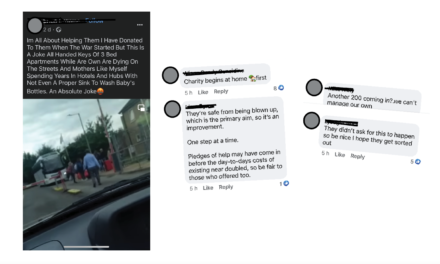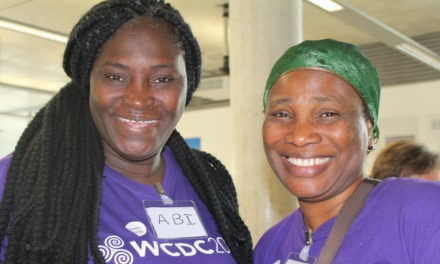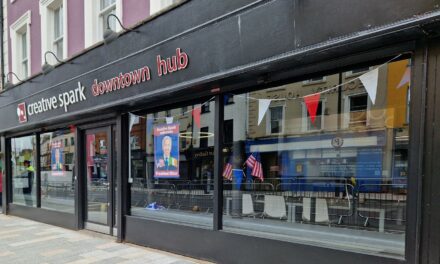Here’s what community-based groups working to fight poverty and exclusion want from the next government. They want housing prioritised. They want childcare workers paid a just wage, rights for people with disabilities, action to end violence against women, priority given to independent community development work and the appointment of a minister for older people. The new government will be called on to restrict the ‘fast fashion’ industry and there is much more.
In the run-up to the poll on February 8, a host of community groups, and community and voluntary sector organisations, released policy papers and manifestos to help voters make informed community-focused choices. The next government would do well to listen to community development voices, as exemplified by those behind the campaign for reform of early years education and childcare.
Childcare
Childcare has become a real challenge for communities, as soaring insurance costs and a lack of state funding have led to increased burdens on staff, providers and parents. Changing Ireland featured a series of articles on the challenges facing the sector in recent issues, and the subject came to national attention in the last few days with a major protest in Dublin on Wednesday 5 February attended by 30,000 people.
The challenge to candidates and political parties: “What are you going to do to rein in insurance companies and support childcare providers and parents with childcare needs?”

30,000 people protested in Dublin over treatment of early years education. Source: Happy Days Playschool – Dromiskin.
Family Resource Centres
Shortly after the #GE2020 date was announced, the Family Resource Centre National Forum (FRCNF) launched a campaign: #SupportingFRCs. This campaign called on candidates to pledge their support for families and family resource centres (FRCs).
According to the FRCNF, FRCs are under threat because there is no dedicated government unit administering them, and because there is “insufficient funding”.
“FRCs are now at a critical juncture,” FRC chairperson Clare Cashman has said. “Without political commitment to copper-fasted our future, families and communities will suffer.”
The FRCNF would like to see the next government: establishing a dedicated government unit to administer FRCs; preserving the autonomy of FRCs and their unique community-development model of family supports; and working to ensure that each FRC receives a minimum of €160,000 per year and three full-time staff members.
The challenge to candidates and political parties: “Family resource centres are at major risk. What can you do to ensure they’re protected and sufficiently funded, to ensure that they continue to be able to provide invaluable services in disadvantaged communities?”
Stronger Communities Build a Stronger Ireland
The Wheel, Ireland’s national association of community and voluntary organisations, charities, and social enterprises, is utilising the #GE2020 cycle to highlight the idea that stronger communities build a stronger Ireland.
Their manifesto asks the incoming government to:
- Recognise and support the value that this sector adds to society;
- Support sustainable funding models;
- Enable responsive services through streamlined compliance systems; and,
- Embrace collaborative partnerships working with the sector.
The challenge to candidates and political parties: “How do you intend to support Ireland’s third sector?”
Ageing Better
Active Retirement Ireland and Age Action have teamed up to call on the next government to make older people a priority by planning sufficiently for an ageing population and ensuring older people remain active, engaged and valued in their communities.
Maureen Kavanagh, CEO of Active Retirement Ireland, said: “A lot of political commentary around ageing tends to pit younger people – in the midst of their working lives – against older people who are retired or nearing retirement. The next government needs to face up to the fact we have a rapidly ageing population, and the measures needed to adapt to that affect all age groups and need to be well planned and long-term.”
The coalition are asking the incoming government ministers (not yet elected) to appoint a senior Minister for Older People, depoliticise the state pension, suspend the planned increase in pension age, appoint a Commissioner for Ageing, and take ambitious climate change action consistent with climate justice to protect people and the planet.
The challenge to candidates and political parties: “What are your views on Ireland’s ageing population, and how do you plan to ensure older people’s long-term quality of life?”
Continuation of long-term strategies
Community Work Ireland (CWI) were active members of the interdepartmental, cross-sectoral group that worked with the Department of Rural and Community Development to produce the five-year Sustainable, Inclusive and Empowered Communities strategy. CWI also played a major role in the development of the Roadmap for Social Inclusion 2020-2025.
The latter was published the very day the Dáil was dissolved, and CWI are asking the next government to establish a high-level cross-sectoral group to be responsible for implementing the Social Inclusion strategy, and to establish a community development anti-poverty programme to work in and with communities most affected by poverty and social inclusion.
With regards to the former, the CWI are calling for: full implementation of the Sustainable, Inclusive and Empowered Communities strategy over the lifetime of the next government; an immediate prioritisation of commitments to support autonomous community work; the establishment of a programme that facilitates independent community work that is targeted at marginalised communities; and the development of a programme to resource and support community-based action on climate justice.
In the context of increased levels of racism and the growing presence of the Far Right (both in Ireland and abroad), the CWI are calling for: a commitment to the enactment of strengthened Hate Crime legislation, to include guidelines on hate speech; a commitment to the development of a new approach to the asylum-seeking process, including an end to for-profit models of direct provision; and a commitment to the development and implementation of a National Action Plan Against Racism, and the re-establishment of a National Anti-Racism and Intercultural Committee.
The challenge to candidates and political parties: “What will you do to ensure that existing roadmaps and strategies that focus on community supports will be fully implemented? And what do you intend to do to stem the rise of racism and hate in Ireland?”
Housing crisis
Social Justice Ireland has released a raft of figures and statistics that show Ireland’s present homelessness and housing crisis in stark light.
According to a report and manifesto released by the organisation in the lead up to #GE2020, there are (as of November 2019) 10,448 people in emergency accommodation. While this does include 1,685 families, it does not include rough sleepers, those accessing Local Authority-owned emergency accommodation, ‘couch surfers’, victims of domestic violence who are in refuges, asylum seekers, or people in direct provision. This indicates that the actual number of homeless people in Ireland is far higher.
This figure nevertheless shows a 60% increase of people in emergency accommodation since the launch of Rebuilding Ireland – a government strategy intended to support people buying homes or building homes, and to accelerate the provision of social housing – in 2016.
Furthermore, there are 68,693 households on social housing waiting lists, not including the roughly 90,000 who are on HAP or rent supplements, or who are housed through the Rental Assistance Scheme.
Targets laid out for social housing builds by Rebuilding Ireland were insufficient from day one. Even worse, however: those insufficient targets are not being met.
Adding a further layer of challenge for those in the housing market, the government has priced “affordable homes” at €320,000, far beyond the reach of any household making less than €82,500 per year.
The picture isn’t much better for renters. Between Q2 of 2012 and Q1 of 2019, private tents have increased by 57%. Average weekly earnings, on the other hand, have increased by less than 10%.
Understandably, Social Justice Ireland has a long list of asks, as well as some pointers that could help the next government lessen the crisis. (Read these on page 2 of their manifesto.)
The challenge to candidates and political parties: “What are you going to do to make easing the housing crisis a priority?”
People with disabilities
According to the Oireachtas Disability Group, poverty levels for people with disabilities have doubled (to 24%) in the last decade. The group is stressing an urgent need for immediate all-government action.
In a press release, the group stated: “In the past week and ahead of the election, we can see a broad consensus forming that we cannot continue with business as usual for the 643,141 people with disabilities who have seen no improvement [in services] since the dark days of the recession.”
The group is calling on the government to: end disability poverty and unemployment; end the housing crisis facing people with disabilities; ensure children with disabilities are fully included in the education system; better fund services and supports; make disability rights a priority.
The challenge to candidates and political parties: “What will you do to make disability rights a priority?”
Fashion
You may not expect to see fashion cropping up on a community development list, but the planet is at a critical turning point when it comes to the clothes we wear.
World Vision Ireland, the Irish Environmental Network and the European Environmental Bureau (EEB) have come together to call on the next Irish government to radically transform the fashion industry, putting real restrictions on the growth of the global ‘fast fashion’ industry.
“The textile industry is one of the biggest polluters and is rife with exploitation,” explained Patrizia Heidegger, director of global policies and sustainably at the EEB. “Our new Wardrobe Change campaign is calling for a radical transformation to how clothes are made, sold, worn and reworn.”
The UN reports that the textile sector is responsible for between 8% and 10% of the world’s greenhouse gas emissions.
“It’s time to move fashion away from the pursuit of ever-more economic growth, which is incompatible with stopping further environment and climate breakdown, and with reducing global inequalities,” said Heidegger.
The challenge to candidates and political parties: “We know there’s an Action Plan to counteract the climate crisis, but at the moment it feels more ‘plan’ than ‘action’. What concrete actions will you be advocating for in the Dáil?”
Female genital mutilation
It may surprise some readers to know that female genital mutilation – a practice most commonly affecting women and young girls in developing nations – is a serious issue facing communities in Ireland.
Ireland’s first conviction relating to female genital mutilation was made on 27 January, 2020.
According to AkiDwA (a national network of migrant women, set up to promote equality and justice): “The incoming government has the opportunity to draw up a programme for government that will prioritise the elimination of violence against women, including female genital mutation of young girls.”
The network is calling for Ireland to ensure that preventative measures are taken (through awareness raising and working within affected communities) and to establish an intergovernmental working group to coordinate the efforts of state agencies, civil society and communities.
Further, the network calls for the new government to go beyond simply ratifying the Istanbul Convention, but to fully implement the commitment that Convention puts on us to safeguard all women and girls.
The challenge to candidates and political parties: “What will you do to ensure the safety and wellbeing of women and young girls in migrant communities?”
Interested in reading more about the state of Ireland’s community development sector? Check out our latest issue.





